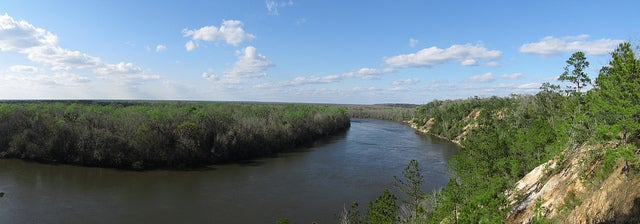Coal Plant Exploits Private Information Ruling to Hide Toxic Ash
A coal plant is exploiting a court ruling concerning private information in order to hide its toxic ash from the public eye.

This page was published 11 years ago. Find the latest on Earthjustice’s work.
In our many years spent battling polluting corporations, we’ve seen some preposterous claims. The recent ridiculous argument posed by Gulf Power, a subsidiary of the $38-billion Southern Company, is one for the record books.
First, some background: As part of a suit we filed under the Clean Water Act, we are trying to get tests of the toxic coal ash—waste left over after coal is burned to generate electricity—that Gulf Power dumps in unlined pits along the Florida Panhandle’s Apalachicola River. Gulf Power’s coal ash pits sit at the corporation’s ancient Scholz Generating Plant, near the tiny town of Sneads.
The coal ash pits are contaminating the river with arsenic, cadmium, and chromium—all well-known carcinogens—as well as aluminum, barium, beryllium, copper, lead, nickel, zinc, selenium and the neurotoxin mercury. We know this because one of the clients in our Clean Water Act lawsuit, the Apalachicola Riverkeeper, tested the river water near one of the 61-year-old plant’s outfalls, and found arsenic levels 300 times the amount considered safe for drinking water. Clearly, tests are needed to match the toxic chemicals in the river with the toxic waste in Gulf Power’s coal ash pits.
But here’s the kicker: Gulf Power claims in a court filing that the testing would be “too intrusive,” and it is basing its argument on a case that involved women who answered a government Centers for Disease Control survey about their sanitary product usage. (The case dealt with the deadly Toxic Shock Syndrome, which was linked to tampons.) Making a woman’s answers to a government survey which details their monthly personal hygiene routines might be legitimately seen as intrusive, and the court did, indeed, protect privacy in that case.
But we hardly see how this relates to toxic chemicals that are flowing into public water supplies. When Gulf Power filed its motion for a protective order to stop our requested testing, we filed an opposition response, arguing that sampling the lower reaches of the ash pit, next to the public’s Apalachicola River, was not an invasion of Gulf Power’s privacy. We await a judge’s decision.
Gulf Power’s federal Clean Water Act permit allows it to discharge treated coal ash water and chlorinated condensing water directly into the Apalachicola through an outfall. But waste is leaking at other points on the site and not receiving proper treatment, and those toxic heavy metal leaks violate Gulf Power’s federal permit requirements.
Besides the Apalachicola Riverkeeper, our other clients in the case are the Southern Alliance for Clean Energy and the Waterkeeper Alliance.
As you are probably aware, the problem of toxic coal ash stockpiles is, unfortunately, a national one. Utility corporations store coal ash all over the country store this toxic waste in massive, unlined pits, and the pits are leaking pollution into groundwater and streams—water that nearby communities often rely on for drinking supplies. These pollutants also build up in ecosystems, and most are dangerous even in very small amounts.
While the Clean Water Act does protect waterways from pollution, there are no federal safeguards specific to coal ash pollution. Household garbage, in fact, is better regulated than toxic coal ash. The state of Florida also has not stepped up to the plate to regulate this pollution. Nationally, coal ash has already contaminated more than 200 lakes, streams, rivers and drinking water aquifers.
You may remember the coal ash disaster that hit North Carolina in February 2014, when a stormwater pipe below a huge Duke Energy coal ash pit failed, and 140,000 tons of toxic pollution spilled into the Dan River. It now coats the river’s bottom for 70 miles downstream, and the full health and economic impacts of this spill are still adding up.
We’re trying to protect the Apalachicola River—which the U.S. Interior Department called “one of the nation’s richest hotspots of biodiversity”—from such a disaster.
Gulf Power announced that it will close its 61-year-old plant next year rather than make needed environmental upgrades. We want to make sure that when Gulf Power shutters the plant, the leaking mess does not threaten the Apalachicola and become the taxpayers’ problem.
The Florida regional office wields the power of the law to protect our waterways and biodiversity, promote a just and reliable transition to clean energy, and defend communities disproportionately burdened by pollution.